- Baby
- Kids
- Adults
- Toys
- Home & Design







Search for brands, products or categories
Respect.
Sustainability
We must take care of our environment. When selecting our suppliers and partners, we attach particular importance to sustainability. Stadtlandkind stands for a conscious and diligent handling of natural resources. Wherever possible, we try to avoid unnecessary transport routes within our logistics processes and thus promote environmental protection.
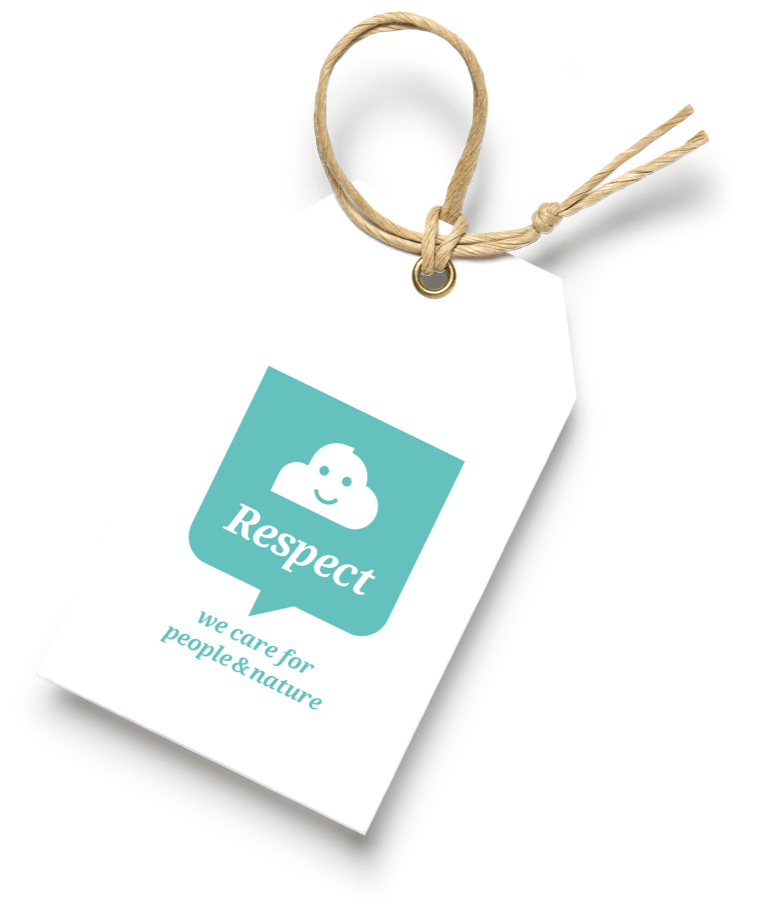

Climate partner

We are a climate neutral company with a climate neutral website!
With various measures to reduce emissions and protect the climate, the Stadtlandkind team has ambitious plans for 2020. Since 1 January 2020, all parcels to and from customers have been transported by Swiss Post in a climate-neutral way. Climate neutrality has also been achieved for the entire company and its website as of 10 March 2020. A major milestone and an important sign for our future! With climate neutrality we support the climate protection project Marine Protection, Plastic Bank, Worldwide. We also support the achievement of global sustainability goals (Sustainable Development Goals), such as fighting poverty or improving living conditions in emerging and developing countries. By balancing our corporate emissions, we are committing ourselves to climate protection and underlining our commitment to sustainability. The "climate neutral" label and our certificate with ID number guarantee transparency: You can track the offsetting of CO2 emissions via the ID and receive information on the climate protection project: www.climatepartner.com/14237-2002-1001. This TÜV-Austria certified process of ClimatePartner stands for security and credibility in climate protection.
To the Climate Partner website
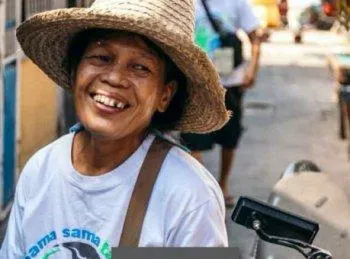
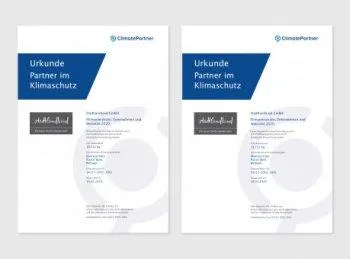

Global Recycled Standard (GRS)

The Global Recycled Standard is managed by the non-profit organisation Textile Exchange.
Aim/focus: The aim of the Global Recycled Standard (GRS) is to increase the amount of recycled material in a product. The standard allows companies to record the exact amount of recycled material in a product and track it through the production chain. The GRS also includes requirements on the additives used in GRS products as well as guidelines on environmental management and corporate social responsibility. The traceability of goods and transparency in the production chain is achieved with the help of the overarching Content Claim Standard (CCS). The GRS logo may be used if a product consists of at least 50 percent recycled materials.

Pro Clima

We ship climate-neutral
As of 1 January 2020, we are sending all deliveries and returns within Switzerland in a climate neutral manner. With this voluntary additional contribution, the CO2 emissions of a delivery are compensated or neutralised by planting a tree or investing in alternative and environmentally friendly forms of transport.

OEKO-TEX® STANDARD100

Tested for harmful substances and therefore harmless to health
If a textile article has been awarded the STANDARD 100 label, you can be sure that all components of this article, i.e. also all threads, buttons and other accessories, have been tested for harmful substances and the article is therefore harmless to health. The testing is carried out by our independent OEKO-TEX® institutes on the basis of our comprehensive OEKO-TEX® criteria catalog. In the testing procedure, they take into account numerous substances, both regulated and non-regulated, that could be harmful to human health. In many cases, the limit values set for STANDARD 100 exceed national and international specifications. The criteria catalog is updated at least once a year and expanded to include new scientific findings or legal requirements.

Kickbag

Reuse to Reduce
The Kickbag is a reusable, flexible bag made of recycled PET with a Velcro closure. The robust, weatherproof and durable Kickbag can be used instead of disposable packaging for shipping almost all products. The bag and shipping are climate-neutral (the emissions of the Kickbag are balanced and 100% offset with climate protection projects), and recycled raw materials are used for the most part in the production. With the Kickbag, the St.Gallen-based companies Stadtlandkind.ch and Stoff&so can significantly reduce their CO2 emissions compared to conventional packaging material. Kickbag GmbH was founded in July 2020. The main shareholding is held by Tobias Zingg, co-founder of the Swiss online concept store Stadtlandkind.ch, and Mariella Huber, co-founder of the online fabric retailer Stoff&so. Based on their many years of experience in e-commerce, they looked for sustainable solutions and developed the Kickbag as an innovative, environmentally friendly alternative to disposable packaging.
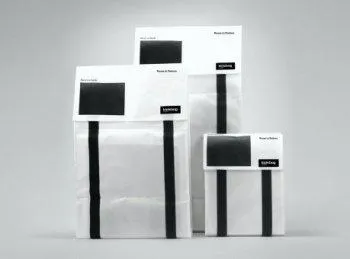
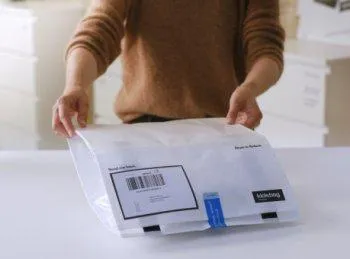
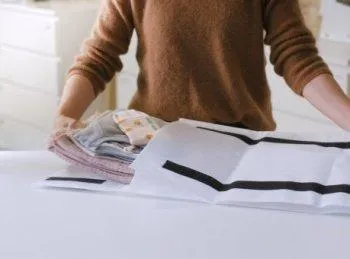
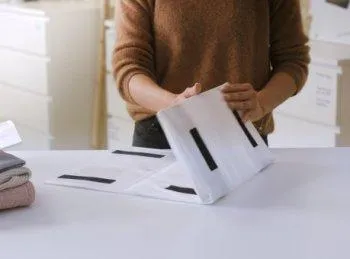
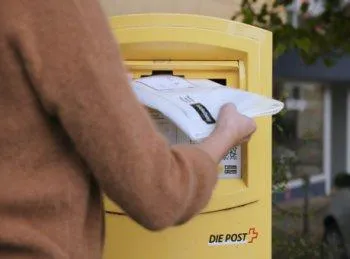
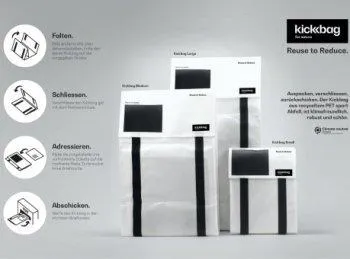

Less Waste

Together we are greener
For ecological reasons we will stop using unnecessary packaging material in the future. With our own label "less waste" we want to create awareness for unnecessary packaging material which ends up in the bin anyways. Additionally, we want to reduce package enclosures whenever possible.
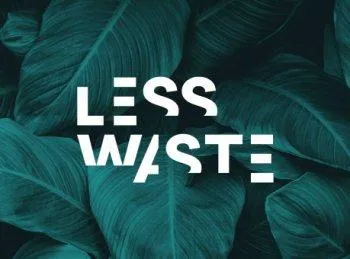
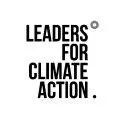
Leaders for Climate Action

We are living in a period with record temperatures, water shortages leading to crop failures, deforestation, species extinction, weather extremes, and climate refugees displaced by drought and flood. This cannot go on - we must set a course for living in harmony within the boundaries of nature.
We believe that the world has to be and also can be completely powered by renewable energies by 2050 - and in some regions as soon as 2030 - and that this has to be done on the basis of a circular economy, in which there will be reusable resources, shared goods, and hardly any waste. Our planet is rich with abundant nature, clean water, and vital resources, all of which are essential for the survival of future generations.
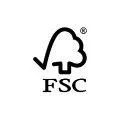
FSC

Promoting environmentally friendly, socially beneficial and economically viable management of forests - that is the mission of the Forest Stewardship Council (FSC). Worldwide. The independent, non-profit, non-governmental organization was founded in 1994 as an outcome of the "Environment and Development" conference in Rio de Janeiro. Today, the FSC has national working groups in more than 80 countries. The FSC label on a wood or paper product is a clear indicator that the product originates from responsible forest management - products bearing the FSC label ensure that forests are used in accordance with the social, economic and ecological needs of present and future generations. In addition, the label ensures that the product has not been mixed with non-certified, i.e. non-controlled, wood or paper on its way to the consumer throughout the entire processing and trade chain. Behind the FSC label is a consistently reliable process: ten principles and 56 indicators have been developed on which the globally valid FSC standards for forest management are based. Forests that are managed according to these standards can acquire the FSC certificate. Consumers who buy FSC products make an active contribution to the sustainable management of forests around the world. The FSC also provides transparency, trademark assurance and advisory services to companies and organizations interested in good forest management.
Subscribe to our newsletter 

Contact
Do you have questions regarding your order or any other concerns?
Then send us an e-mail, so we can contact you as soon as possible.


 New In
New In Clothing
Clothing Bodies + Onesies
Bodies + Onesies Bodies
Bodies Onesies + Overalls
Onesies + Overalls Shirts + Tops
Shirts + Tops Longsleeve Shirts
Longsleeve Shirts T-Shirts + Tops
T-Shirts + Tops Blouses + Shirts
Blouses + Shirts Sweatshirts + Knitwear
Sweatshirts + Knitwear Sweatshirts
Sweatshirts Hoodies
Hoodies Knitwear
Knitwear Pants
Pants Chinos + Joggers
Chinos + Joggers Jeans
Jeans Overalls + Dungarees
Overalls + Dungarees Shorts
Shorts Leggings
Leggings Rain Pants
Rain Pants Snowpants + Overalls
Snowpants + Overalls Tights + Socks
Tights + Socks Tights
Tights Socks
Socks Dresses & Skirts
Dresses & Skirts Dresses
Dresses Skirts
Skirts Jackets
Jackets Light Jackets + Vests
Light Jackets + Vests Rainjackets
Rainjackets Winterjackets + Coats
Winterjackets + Coats Nightwear
Nightwear Pyjamas
Pyjamas Onesies
Onesies Sleeping Bags
Sleeping Bags Swimwear
Swimwear Swim Shorts
Swim Shorts Swimsuits + Bikinis
Swimsuits + Bikinis Swimshirts UVP
Swimshirts UVP Beach Towels + Bathrobes
Beach Towels + Bathrobes Bathing Accessoires
Bathing Accessoires Caps + Sun Hats
Caps + Sun Hats Shoes
Shoes Crawling Shoes
Crawling Shoes Baby Walkers
Baby Walkers Slippers
Slippers Sneaker
Sneaker Loafers + Flats
Loafers + Flats Boots
Boots Sandals
Sandals Accessoires
Accessoires Scarfs
Scarfs Beanies
Beanies Caps + Sun Hats
Caps + Sun Hats Gloves + Mittens
Gloves + Mittens Sunglasses
Sunglasses Hair Accessoires
Hair Accessoires Jewellery
Jewellery Nooshis + Blankets
Nooshis + Blankets Nursing Pillow
Nursing Pillow Baby Care
Baby Care Care Products
Care Products Diapers + Wipes
Diapers + Wipes Pacifies + Bottles
Pacifies + Bottles Babycarriers + Slings
Babycarriers + Slings Diaper Bags
Diaper Bags Birth Gifts
Birth Gifts Birth Gifts
Birth Gifts Vouchers
Vouchers Gift Sets
Gift Sets Clothing
Clothing Shirts + Tops
Shirts + Tops Longsleeve Shirts
Longsleeve Shirts T-Shirts + Tops
T-Shirts + Tops Blouses
Blouses Shirts
Shirts Sweatshirts + Knit
Sweatshirts + Knit Sweatshirts
Sweatshirts Hoodies
Hoodies Knitwear
Knitwear Pants
Pants Chinos + Joggers
Chinos + Joggers Jeans
Jeans Overalls + Dungarees
Overalls + Dungarees Shorts
Shorts Leggings
Leggings Rainpants
Rainpants Snowpants + Snowoveralls
Snowpants + Snowoveralls Dresses + Skirts
Dresses + Skirts Dresses
Dresses Skirts
Skirts Jackets
Jackets Light Jackets + Vests
Light Jackets + Vests Rainjackets
Rainjackets Snowjackets
Snowjackets Winterjackets + Coats
Winterjackets + Coats Lingerie + Underwear
Lingerie + Underwear Nightwear + Pajamas
Nightwear + Pajamas Underwear
Underwear Socks
Socks Tights
Tights Swimwear
Swimwear Swim Shorts
Swim Shorts Swimsuits
Swimsuits Bikinis
Bikinis Swimshirts UVP
Swimshirts UVP Beach Towels + Bathrobes
Beach Towels + Bathrobes Bathing Accessoires
Bathing Accessoires Caps + Sun Hats
Caps + Sun Hats Shoes
Shoes Sneaker
Sneaker Loafers + Flats
Loafers + Flats Slippers
Slippers Boots
Boots Sandals
Sandals Hiking Boots
Hiking Boots Accessoires
Accessoires Beanies
Beanies Caps + Sun Hats
Caps + Sun Hats Scarfs
Scarfs Gloves + Mittens
Gloves + Mittens Belts + Umbrellas
Belts + Umbrellas Sunglasses
Sunglasses Jewellery + Watches
Jewellery + Watches Hair Accessoires
Hair Accessoires Bike Helmets
Bike Helmets Ski Helmets + Goggles
Ski Helmets + Goggles Bags + Backpacks
Bags + Backpacks Backpacks
Backpacks Trailers + reflectors
Trailers + reflectors Nursery school bags
Nursery school bags Handbags + Weekender
Handbags + Weekender Gymbags + Sportsbags
Gymbags + Sportsbags Bellybags
Bellybags Toiletry Bag + Wallets
Toiletry Bag + Wallets Cosmetics + Care
Cosmetics + Care Face + Body
Face + Body Hair + Nails
Hair + Nails Fragnance + Wellness
Fragnance + Wellness Vouchers
Vouchers Clothing
Clothing Shirts + Tops
Shirts + Tops Longsleeve Shirts
Longsleeve Shirts T-Shirts + Tops
T-Shirts + Tops Blouses + Shirts
Blouses + Shirts Yoga + Sport
Yoga + Sport Sweatshirts + Knit
Sweatshirts + Knit Sweatshirts
Sweatshirts Hoodies
Hoodies Knitwear
Knitwear Yoga + Sport
Yoga + Sport Pants
Pants Chinos + Jogger
Chinos + Jogger Jeans
Jeans Overalls + Dungarees
Overalls + Dungarees Shorts
Shorts Leggings
Leggings Rainpants + Snowpants
Rainpants + Snowpants Yoga + Sport
Yoga + Sport Dresses + Skirts
Dresses + Skirts Dresses
Dresses Skirts
Skirts Jackets
Jackets Light Jackets + Vests
Light Jackets + Vests Rainjackets
Rainjackets Snowjackets
Snowjackets Winterjackets + Coats
Winterjackets + Coats Lingerie + Swimwear
Lingerie + Swimwear Underwear
Underwear Nightwear
Nightwear Socks + Tights
Socks + Tights Bikinis
Bikinis Swimpants
Swimpants  Swimsuits + Swimshorts
Swimsuits + Swimshorts Beach Towels + Bathrobes
Beach Towels + Bathrobes Shoes
Shoes Sneaker
Sneaker Loafers + Flats
Loafers + Flats Slippers
Slippers Boots
Boots Sandals
Sandals Hiking Boots
Hiking Boots Accessoires
Accessoires Beanies
Beanies Sun Hats + Caps
Sun Hats + Caps Scarfs
Scarfs Gloves + Mittens
Gloves + Mittens Belts
Belts Sunglasses and swimming accessories
Sunglasses and swimming accessories Bags + Backpacks
Bags + Backpacks Backpacks + Gymbags
Backpacks + Gymbags Handbags
Handbags Shopper + Weekender
Shopper + Weekender Smartphone + Laptop Bags
Smartphone + Laptop Bags Baskets
Baskets Toiletry Bags + Wallets
Toiletry Bags + Wallets Diaper Bags
Diaper Bags Jewelry
Jewelry Earrings
Earrings Necklaces
Necklaces Wristbands
Wristbands Rings
Rings Hair Accessoires
Hair Accessoires Cosmetics + Care
Cosmetics + Care Face + Body
Face + Body Hair + Nails
Hair + Nails Fragnance + Wellness
Fragnance + Wellness Vouchers
Vouchers Cuddly Toys + Dolls
Cuddly Toys + Dolls Stuffed Animals
Stuffed Animals Plush + Stuffed Animals
Plush + Stuffed Animals Thermal Cuddly Toys
Thermal Cuddly Toys Dolls + Doll Houses
Dolls + Doll Houses Dolls
Dolls Doll Clothing
Doll Clothing Doll Accessoires
Doll Accessoires Doll Houses
Doll Houses Doll Furniture
Doll Furniture Doll Figures
Doll Figures Role Play
Role Play Cars + Garages
Cars + Garages Cars + Vehicles
Cars + Vehicles Garages + Roads
Garages + Roads Trains + Railroads
Trains + Railroads Airplanes + Helicopters
Airplanes + Helicopters Kitchen + Stores
Kitchen + Stores Play Kitchens
Play Kitchens Kitchen Accessoires
Kitchen Accessoires Toy Food
Toy Food Toy Stores
Toy Stores Costumes + Professions
Costumes + Professions Play + Learn
Play + Learn Family + Board Games
Family + Board Games Educational Games
Educational Games Build + Construct
Build + Construct Explore + Discover
Explore + Discover Montessori + Waldorf
Montessori + Waldorf Puzzles
Puzzles Nature
Nature Books
Books Baby Books
Baby Books Picture Books + Read out
Picture Books + Read out Teen + Adult Books
Teen + Adult Books Crafting
Crafting Paint + Draw
Paint + Draw DIY Craft Kit
DIY Craft Kit Textiles + Wood
Textiles + Wood Work Benches + Saws
Work Benches + Saws Music
Music String Instruments
String Instruments Keyboard Instruments
Keyboard Instruments Percussion + Rhyhm
Percussion + Rhyhm Kids Music
Kids Music Movement + Outdoor
Movement + Outdoor Movement Toys
Movement Toys Swings + Gymnastic Rings
Swings + Gymnastic Rings Stapelsteine
Stapelsteine Balanceboards + Wobbel
Balanceboards + Wobbel Climbs + Slides
Climbs + Slides Ball pools
Ball pools Toys for Outdoor
Toys for Outdoor Sandpit
Sandpit Paddling Pool + Accessoires
Paddling Pool + Accessoires Sport
Sport Sledges
Sledges Family Games
Family Games Kits + Wind Chimes
Kits + Wind Chimes Play Tents + Houses
Play Tents + Houses Tents + Canopies
Tents + Canopies Carpets + Mats
Carpets + Mats Vehicles + Bicycles
Vehicles + Bicycles Walker Bikes
Walker Bikes Bicycles
Bicycles Tricycles
Tricycles Slider
Slider Scooter
Scooter Helmets + bike accessories
Helmets + bike accessories Hand Cart
Hand Cart Baby Toys
Baby Toys Griffins + Rattles
Griffins + Rattles Teething Rings
Teething Rings Snuggle Towels + Animals
Snuggle Towels + Animals Toy Clocks
Toy Clocks Stroller Chains
Stroller Chains Play Blankets
Play Blankets Pull-along Toys
Pull-along Toys Baby Walker
Baby Walker Motor Skills + Activity Toys
Motor Skills + Activity Toys Bath Toys
Bath Toys Rocking Horses + Slider
Rocking Horses + Slider Stacking Toys
Stacking Toys Building Blocks
Building Blocks Babypuzzles
Babypuzzles Vouchers
Vouchers Home
Home Storage
Storage Candles + Room Scent
Candles + Room Scent Pillows + Blankets
Pillows + Blankets Lamps
Lamps Mirrors
Mirrors Chairs + Furniture
Chairs + Furniture Carpets
Carpets Vases + Decoration
Vases + Decoration Wall decoration
Wall decoration Stationary
Stationary Christmas shop
Christmas shop Kitchen + Food
Kitchen + Food Storage
Storage Cutlery
Cutlery Glasses + Cups
Glasses + Cups Kitchen gadgets + utensils
Kitchen gadgets + utensils Kitchen Textiles
Kitchen Textiles Lunch Boxes
Lunch Boxes Plates + Bowls
Plates + Bowls Drinking Bottles
Drinking Bottles Bathroom
Bathroom Towels
Towels Toilet brushes + bins
Toilet brushes + bins Bathroom accessories
Bathroom accessories Bedroom
Bedroom Bed linen
Bed linen Curtains + Canopies
Curtains + Canopies Babyroom + Babyarticles
Babyroom + Babyarticles Cribs, Mattresses, Bed Linen
Cribs, Mattresses, Bed Linen Sleeping Bags, Nests, Babyblankets
Sleeping Bags, Nests, Babyblankets Mobiles + Lamps
Mobiles + Lamps Changing Table + Accessoires
Changing Table + Accessoires Crawling Blankets
Crawling Blankets Baby Bouncer + High Chairs
Baby Bouncer + High Chairs Strollers + Car Seats
Strollers + Car Seats Kids Room
Kids Room  Bes + Bed Linen
Bes + Bed Linen Kids Furniture
Kids Furniture Lamps
Lamps Carpets
Carpets Pillows
Pillows Storage
Storage Poster + wall decoration
Poster + wall decoration Vouchers
Vouchers






 Thank you! You have successfully entered the newsletter!
Thank you! You have successfully entered the newsletter! 

